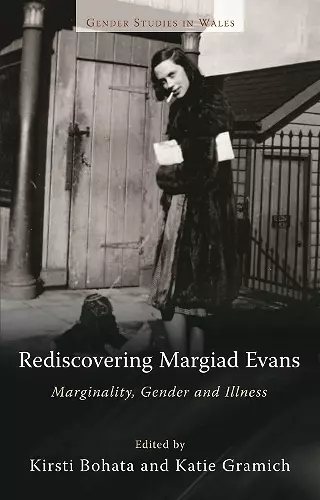Rediscovering Margiad Evans
Marginality, Gender and Illness
Kirsti Bohata editor Katie Gramich editor
Format:Paperback
Publisher:University of Wales Press
Published:28th Feb '13
Currently unavailable, and unfortunately no date known when it will be back

Margiad wrote about the elderly, about love between women, about elusive, enigmatic characters. She is renowned for her ability to depict place, yet she also makes place reflective of the emotional and spiritual lives of her characters and her own concerns as an artist. Evans was a border writer, concerned with cultural complexity and conflict characteristic of borderlands, but also filled with passion for the landscape of the borders and the many meanings, local and figurative; she effortlessly invests in the places she loved. Her life was transformed in later years by epilepsy, followed by the diagnosis of a brain tumour that lead to her early death, on the evening of her forty-ninth birthday, in 1958. Evans wrote A Ray of Darkness, an acclaimed autobiography about her experience of epilepsy, and as a result Margiad Evans is being 'rediscovered' by the medical community as it becomes more interested in patient experiences. This collection of essays assesses Evans's extraordinary literary legacy, from her use of folktale and the gothic to the influence of her epilepsy on her creative work.
This is an excellent collection of essays on the early twentieth-century writer, Margiad Evans, a distinctive and original writer whose talent has been little recognized. The contributors draw on a wealth of undiscovered archival resources in this scholarly and engaging account of many different aspects of Evans's life and work, including her identity as a woman, her epilepsy and medical condition, and her gothic imagination. Professor Mary Joannou, Professor of Literary History and Women's Writing, Anglia Ruskin University This is an important book, and an interesting one. The contributors include many of the most distinguished scholars of Welsh Writing in English, and between them they do a marvellous job of remembering Margiad Evans, an author for whom memory was centrally important. Evans's very liminality has seen her disappear between the cracks of a number of scholarly preoccupations, squeezed out of literary history by masculinist and high-culturalist assumptions about Modernism, and by colonialist assumptions about Wales. The rigid thinking of conventional literary aesthetics has done Margiad Evans a great disservice, and the editors and contributors to this book have done wonders to redress this. Professor Darryl Jones, School of English, Trinity College Dublin
ISBN: 9780708325605
Dimensions: unknown
Weight: 318g
288 pages